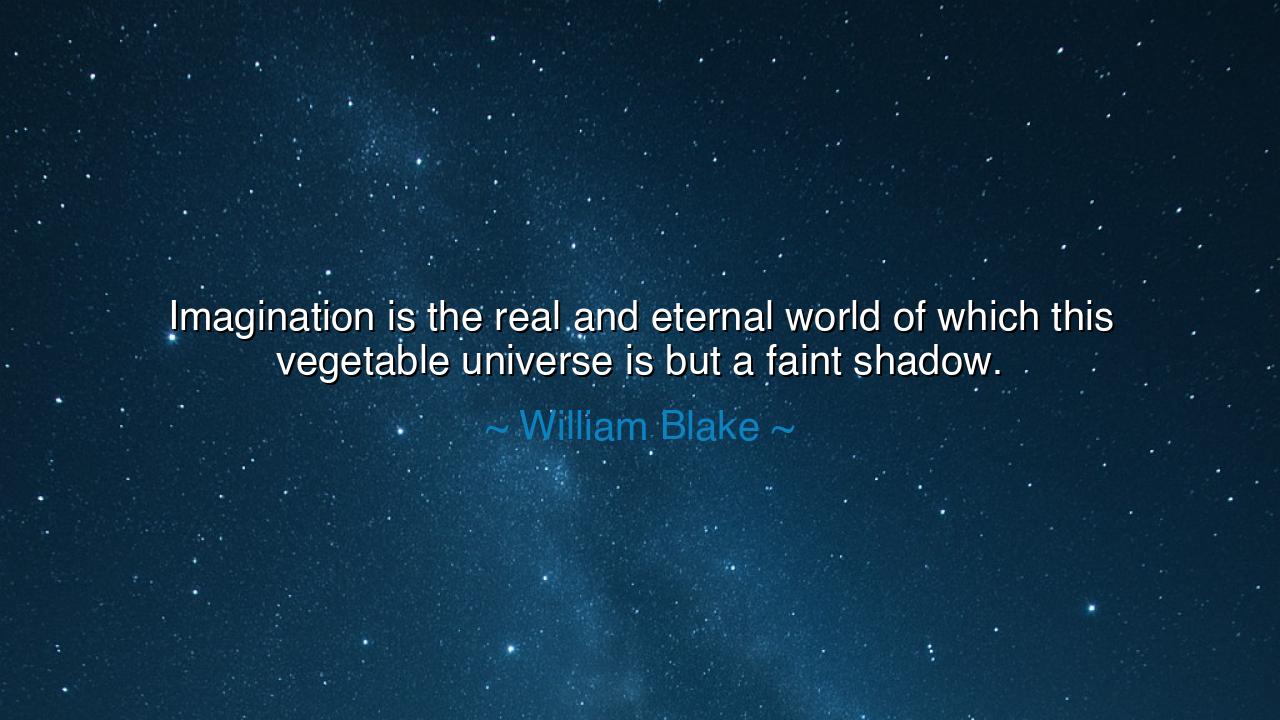
Imagination is the real and eternal world of which this vegetable
Imagination is the real and eternal world of which this vegetable universe is but a faint shadow.






“Imagination is the real and eternal world of which this vegetable universe is but a faint shadow.” Thus proclaimed William Blake, the mystic poet and painter whose vision pierced beyond the veil of the visible. His words, like fire drawn from the heart of creation, remind us that the imagination is not mere fancy, nor idle dreaming, but the true realm of existence — the eternal world, from which all that we see and touch is but a fleeting reflection. To Blake, the so-called “vegetable universe” — the physical world of matter and growth — was but a dim echo of the living spirit that shapes it. His was not the vision of a man bound to the earth, but of one who walked daily in eternity.
The origin of this quote can be found in Blake’s prophetic writings, most notably in Jerusalem and Milton, where he described the universe as a divine unfolding of imagination — the very breath of God manifest through human vision. To him, the Imagination was not the mind’s illusion but the Creator’s own faculty, planted within the human soul as a spark of divine power. The world that we perceive with our senses, the “vegetable universe,” is alive only because the imagination gives it form and meaning. Without imagination, reality is but dust and decay. Thus, Blake saw imagination not as an escape from reality, but as its source, its heartbeat, its eternal truth.
Blake lived in an age of reason, when science and materialism sought to strip the world of its mystery. Men measured the stars but forgot to wonder at their song; they studied the body but denied the spirit. Against this tide, Blake stood as a prophet crying out in defense of vision. He declared that the true reality was not in the microscope or the telescope, but in the imagination — the inner light through which the human soul communes with eternity. For him, the physical world was transient, “a faint shadow,” ever changing and destined to perish. But the world of the spirit, the world of imaginative truth, is immortal.
Consider, for a moment, the life of Michelangelo Buonarroti, the sculptor who gazed upon blocks of marble and saw within them divine figures longing for release. To the eye of the ordinary man, the marble was cold and unyielding. But to Michelangelo’s imagination, it was alive with form and soul. He famously said that his task was not to create, but to “set free” what already existed within the stone. Here lies Blake’s teaching made flesh: the material world — the “vegetable universe” — is but the raw shadow, and the imagination is the realm of the real, where truth already exists, awaiting only the artist’s hand, the poet’s word, or the dreamer’s faith to bring it forth.
Blake’s words are not merely for the artist, but for all humankind. For each person is both creature and creator, both shadow and light. When we look only upon the outer world — upon wealth, status, or appearances — we dwell in the faint reflection. But when we turn inward, when we awaken the imagination, we glimpse the eternal — love, beauty, justice, and meaning — those unseen forces that give the world its shape. The imagination is not a private fantasy but a shared divine vision: it is how humanity participates in creation itself. To live without imagination is to live in darkness, knowing the forms of things but not their essence.
And yet, the path of the visionary is never easy. Blake himself was mocked as mad, his art dismissed, his revelations ridiculed by those who could not see beyond the material. But he endured, for he knew that the eternal world is not built from the opinions of men. He lived as a pilgrim of the imagination, unshaken in his conviction that what the world calls “real” is only a fleeting shadow upon the walls of eternity. His life teaches us that to follow the imagination is to walk the harder road — one of solitude, courage, and faith — yet it is also the road that leads to light.
So let this be the lesson, O seeker of truth: do not mistake the shadow for the sun. The world of appearances, though beautiful, is but the echo of something greater — the song of the imagination resounding through creation. Feed that inner light. Nourish it with wonder, art, reflection, and love. Do not let the clamor of reason or the weight of routine extinguish it. When you see the world, look deeper — see not only what is, but what might be, what must be, what already exists in the eternal realm of the imagination.
For as Blake teaches, the imagination is the true universe — infinite, living, divine. This physical world will fade like mist at dawn, but the world within, the world of vision and spirit, endures forever. Therefore, live as one who walks in both — shaping the shadow with the fire of the real. Let your imagination be your telescope to eternity, and you shall see, as Blake saw, that heaven is not above or beyond us, but burning quietly within.






AAdministratorAdministrator
Welcome, honored guests. Please leave a comment, we will respond soon